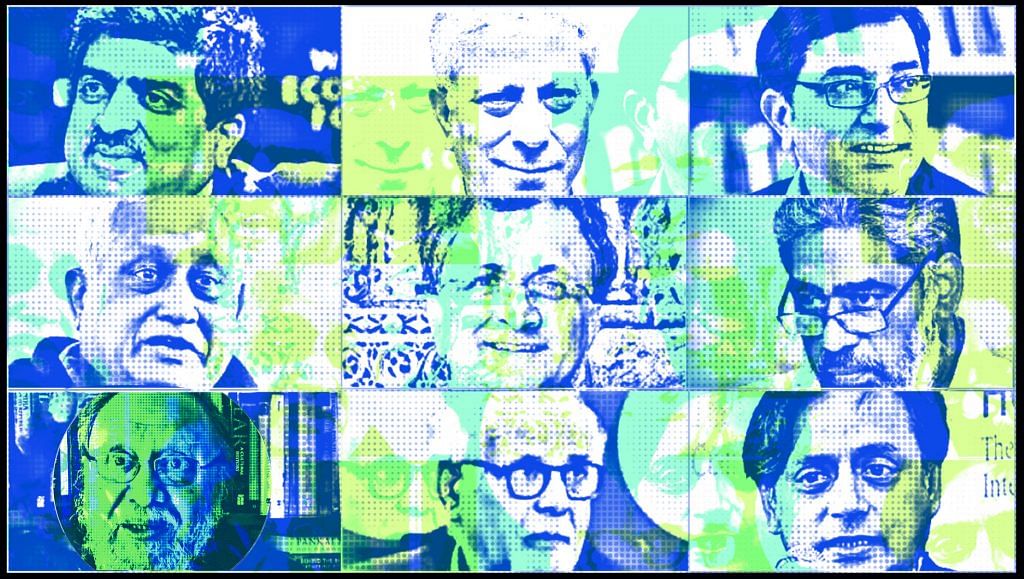ThePrint’s intellectual list presents a homogeneous group of English-speaking people who look similar to each other.
The people in ThePrint’s list of next-gen intellectuals are bound together by the thread of the English language. That there is no name of an intellectual who has worked in the Indian languages is reflective of the narrowness of the world of the intellectual elite.
It is interesting that there was no effort made by them to even find names from the Tamil, Gujarati, Malayalam or Odiya world. It seems they are not even perturbed by these absences. But they should not be blamed for it. It was for the curator to find names like K. Satchidanandan, Ashok Vajpeyi, Nabaneeta Dev Sen or Ganesh Devy who would have told us about promising minds active in Indian languages.
It is true that English is in a way now an Indian language, but not to take into consideration the vast universe of Indian languages shows how careless our best minds can be. A language, which a tiny minority is familiar with, and an even tinier well versed in, is thought to be the sole reservoir of intellect in this vast land – it just shows the arrogance of our intellectual leaders.
Also read: This is the next generation of Indian intellectuals
ThePrint’s list also presents a homogeneous group of people who look similar to each other. No voice from Dalits, Muslims, disabled, and the dominance of men in an India where young women are doing excellent work in different fields shows that intellection is still considered a preserve of the upper caste Hindu male in India. It is interesting and dismaying to see how the nominators have myopically confined themselves to their disciplines and areas of work. They couldn’t look beyond selected area specialists, or experts from their own domains.
It leads one to think that there might be confusion about categories. There is a difference between an academic and an intellectual. All academics, even the good ones, are not necessarily intellectuals. Normally, we see them take pride in the fact that they are primarily analysts, they believe in going into the nuances of the things and they avoid looking at issues in black and white. In short, they avoid taking sides.
Also read: Why ThePrint list of gen-next intellectuals did not have any women nominators
This is the great inhibition our good minds have to overcome. The question that we need to ask is who is an intellectual? An intellectual in our times is necessarily a person who, according to Noam Chomsky, fulfils the obligation that arises because of the special space she inhabits. He writes, “Intellectuals are in a position to expose the lies of governments, to analyze actions according to their causes and motives and often hidden intentions.” Since they, through their work, know what is happening, they are duty-bound to tell people about how things are being obfuscated.
An intellectual is thought to be one who speaks truth to power. But the task of the intellectual is more difficult and complex. Power knows the truth. It is the people who don’t know and it is the job of the intellectual to tell them the truth.
An intellectual is, of course, someone who understands, but if she does not get angry, then it is very difficult to call her an intellectual. An intellectual must intervene, and intervene when it would make difference, not preserve herself for better times to come, nor leave the task of intervention to those who are patronisingly and also derisively called ‘activist’ intellectuals.
Also read: In Modi-era, intellectuals confess they are confused
An intellectual is necessarily an activist of ideas. Who asserts the primacy of ideas in a world, which had created a neat division between theorising and practice. Those who practice their ideas are seen mostly with suspicion.
Terry Eagleton said that you can identify an intellectual with the way she speaks. When you say “This is torture!” it must imply “It has to stop”. But if you have no exclamation sign and do not suggest what to do with it, you have no right to be called an intellectual.
Intellectuals are different from policy makers and advisers. They do not feel beholden to the state. An intellectual has to take the side of the dispossessed and oppressed. It is not the job of an intellectual to rationalise the actions of the powers that be. Arvind Subramanian now says that demonetisation was a disaster, but he kept mum when it was urgent to tell the people what was being done to them. He preserved himself, but failed as an intellectual.
To recognise the urgency of the situation and then act is what distinguishes an intellectual from an academic. One hopes that our intellectuals don’t fail their times and people.
Apoorvanand teaches Hindi at Delhi University.
